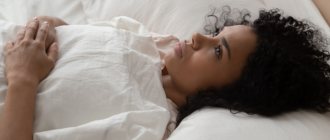It is very difficult to ignore such a problem, because... sleepless nights affect our entire lives. In addition to the inability to work actively during the day, a disrupted routine has other disadvantages. Lack of adequate, 7-8 hour sleep leads to a weakened immune system, memory impairment, and the development of cardiovascular diseases. Problems with fine motor skills arise, and causeless irritability appears. To all this, thoughts about “senile insomnia” are added, and the mood eventually becomes worse, and both personal life and work suffer from this. To understand how to cope with this manifestation of menopause, you need to understand what its cause is.
Sleep problems and other signs of menopause
Quite often, women aged “45 plus” turn to doctors with a request to prescribe them pills for insomnia during menopause. Experts clarify: it is incorrect to talk only about insomnia. The hormonal changes that occur in the female body during this period provoke a fairly wide range of problems. These include difficulties falling asleep, frequent awakenings, getting up early for no reason, and nightmares...
Hormonal changes that occur in the female body during menopause provoke not only insomnia, but also other sleep disorders: difficulty falling asleep, frequent awakenings, getting up early for no reason, nightmares
Non-drug treatment of insomnia during menopause
The range of measures for non-drug therapy for insomnia during menopause includes:
- Normalization of the daily routine with the opportunity to rest and recover, but always without rest during the daytime.
- Optimizing physical activity levels. It can be both restrictive - if a woman is “used to being on time everywhere”, and stimulating - for “inveterate homebodies”. However, any physical training is contraindicated 2-3 hours before bedtime: no jogging, no sports - only walks in the fresh air are allowed.
- Limiting negative information stress load. But given the neuroendocrine changes that occur in the body during menopause, the reaction to even minor problems can be unpredictable. In such situations, cognitive behavioral psychotherapy has a good effect.
- Proper nutrition. It is important not only to normalize the diet (this is especially important if you are overweight), but also to have the correct time for the last meal - at least 3 hours before expected sleep.
- The correct conditions for night sleep are fresh, cool air, the absence of extraneous noise and light stimuli in the bedroom, a comfortable bed and many other factors.
- Relaxation techniques. This is self-massage, massage, warm baths (including with essential oils, salt), intimacy.
Estrogens no longer protect during menopause
When menopause occurs, the level of the main female sex hormone, estrogen, sharply decreases. This is the most important cause of insomnia and other sleep problems. The fact is that estrogens protect sound sleep. If hormones are produced in sufficient quantities, then our brain can “ignore” unimportant external stimuli for the sake of proper rest.
During menopause, estrogen protection disappears and the brain overreacts to any, even the most insignificant, noise. Low estrogen levels cause us to flinch at every sound outside and wake up when our neighbors come home late.
Due to low estrogen levels during menopause, our brain overreacts to any noise, no matter how small.
Manifestations of menopause: low progesterone
As is known, in menstruating women estrogen is synthesized in the first phase of the cycle, and progesterone in the second. This is another important female hormone that also affects the quality of sleep. Progesterone has a calming effect on the nervous system. But since female hormones during menopause are not produced in sufficient quantities, the lack of progesterone immediately affects our nerves.
It is because of progesterone deficiency that the brain is in constant arousal and does not allow sleep. Low progesterone “forces” us to “hold work meetings” all night long and endlessly scroll through the same thoughts in our heads. Due to the lack of the hormone, instead of a restful sleep, a wave of anxiety comes over us, we are thrown into the heat, then into the cold and have nightmares.
Principles of drug therapy
The issue of prescribing sleeping pills is decided strictly individually. Their widespread use in therapeutic medicine is limited due to the risk of adverse reactions. These include daytime drowsiness and fatigue, decreased performance, a ban on driving, the gradual development of addiction, which is why patients often independently increase the daily dose, and addiction. However, when the patient simply cannot sleep and function fully, the doctor selects sleeping pills. But the course of taking them should not exceed 2-3 weeks, the tablets should be taken strictly in the dosage prescribed by the doctor, and such drugs should be discontinued gradually.
But in most cases, when treating insomnia during menopause, they try to avoid symptomatic therapy alone. The patient is prescribed medications for the general correction of her condition. This:
- Restoration of physiological hormonal balance. For minor violations, it is quite possible to limit yourself to herbal remedies, but hormonal drugs are often selected. This allows you to normalize sleep, get rid of somatovegetative symptoms (hot flashes, sweating), and cope with constant mood swings.
- General decrease in nervous excitement. First of all, completely safe sedatives based on medicinal plants and homeopathy are used for treatment. However, if a psychotherapist has diagnosed depression, a course of antidepressants is indicated, and the specific drug is selected individually depending on the prevailing symptoms (for example, anxiety, melancholy, self-blame, etc.).
- Correction of associated disorders. If necessary, cardioprotectors, antihypertensive, antiarrhythmic, lipid-lowering drugs, and drugs for correcting the lipid profile are prescribed. Vitamins and restorative drugs are mandatory.
Recent clinical studies have demonstrated the high effectiveness of medications based on artificial melatonin analogues. It has been proven that such drugs in the treatment of insomnia during menopause help improve the quality of sleep and restore the duration of its phases. Adequate rest also reduces emotional tension and helps reduce the level of general anxiety and restlessness.
The text was checked by expert doctors: Head of the socio-psychological service of the Alkoklinik MC, psychologist Yu.P. Baranova, L.A. Serova, a psychiatrist-narcologist.
CAN'T FIND THE ANSWER?
Consult a specialist
Or call: +7 (495) 798-30-80
Call! We work around the clock!
Menopause and melatonin deficiency
After menopause, the body's ability to synthesize melatonin, a hormone that allows us to sleep soundly and fall asleep quickly, decreases. Another problem that arises during menopause is that it becomes more difficult to fall asleep. By the way, melatonin is called not only the sleep hormone, but also the hormone of youth, because it slows down the aging process and promotes cell restoration during sleep.
It is known that it is produced only in the dark, and any light sources block this process. That is why one of the important medical recommendations on how to behave during menopause is maintaining sleep hygiene. In the scientific world, such a concept as “light pollution” even appeared. It is becoming more and more difficult for a modern person to create a “dark corner” for a comfortable rest: lanterns are shining through the windows, the phone and tablet on charge are blinking, someone in the household is watching TV... All this interferes with the synthesis of melatonin. But a woman’s health after 45 years depends greatly on her proper rest. Sleep disorders prevent the body and brain from recovering properly overnight, making us an easy target for age-related diseases.
Never go to bed with the night light on or the curtains open, much less with the TV on. If this is not possible, use a special sleep mask.
The expert's advice is as follows: everything possible must be done to help the body replenish its melatonin reserves.
- Get into the habit of going to bed early. The sleep hormone is produced from midnight to four in the morning. At this time, sound and deep sleep is important.
- Eliminate all light sources. If light hits the retina, melatonin synthesis stops. Therefore, never go to bed with the night light on or the curtains open, much less with the TV on. When this is impossible, use a special sleep mask.
- After seven in the evening you need to prepare your body for bed. Therefore, it is better to turn off or dim the bright overhead lighting. But the soft light of a floor lamp or table lamp, on the contrary, has a calming effect.
- If you need to work in the evening, then it is better to use directional light and under no circumstances arrange a “white day” throughout the apartment.
Menopause symptoms: restless legs syndrome
Poor sleep can be caused by restless legs. Such symptoms of menopause are often found in women after 50. Patients complain that they cannot sleep due to unpleasant sensations in the lower extremities (tingling, burning, goosebumps) and an obsessive desire to move their legs (stand up and stretch, because it becomes easier when moving) .
Why is this happening? Modern medicine believes that one of the decisive factors is hormonal imbalance. During menopause in women, the level of sex hormones in the blood sharply decreases, which in turn reduces the sensitivity of cells to hormones, in particular to the hormone and neurotransmitter dopamine. Dopamine is involved in the regulation of muscle tone and coordination of the work of different muscles. If the cells “do not perceive it, then symptoms such as persistent tension and the inability to relax occur. Treatment in this case should be comprehensive and require the cooperation of a gynecologist, endocrinologist and neurologist.
Causes of insomnia
Psycho-social stress. For example, this happens due to excessive anxiety about money and work, illness of children and loved ones. When crises happen in your personal life and you conduct an internal dialogue, bringing to perfection what you haven’t done in reality.
Depression
of a different nature, a state of blues and anxiety;
Increased brain activity
and emotional overarousal, both positive and negative. This often happens during sessions, before and after important business meetings, before trips and vacations, during periods of intense activity and multitasking. elderly age;
Discomfort
both mental and physical, the influence of extraneous sounds, light, noise. Darkness is one of the main conditions under which the sleep hormone melatonin is produced in sufficient quantities. The slightest lighting, watching TV or a phone monitor before bed can affect the quality of melatonin production and disrupt sleep. Often the cause of poor sleep can be discomfort caused by bedding - an uncomfortable pillow, too hard, too soft, uneven mattress. In this case, solving the problem becomes less problematic;
Non-compliance with the regime
day and biorhythms. For example, a shift work schedule, frequent time zone changes. This often happens with simple night owls, the so-called “night owls,” whose peak activity occurs in the afternoon and evening. It is difficult for them to go to bed on time, it is difficult for them to fall asleep and wake up at the appointed early hour, because a lot of time, energy and effort have been spent trying to sleep;
Alcohol
and caffeinated drinks. They also cause sleep disturbances. Especially if drinking such drinks happened in the evening. Needless to say how harmful they are for healthy sleep. Alcohol is wrongly considered by some to be a sedative and hypnotic. While it may actually make it easier to fall asleep, the quality of your sleep will suffer significantly. And all because alcohol inhibits the REM sleep phase. The same one during which the body’s strength is restored, when we dream and our brain organizes the information received. In addition, alcohol and caffeine can put a strain on the cardiovascular system, provoke snoring and sleep apnea, which act like a time bomb on the body, provoking both mental and functional disorders;
Apnea
- breathing disorders that can occur under the influence of substances, or due to the structural features of the nasopharynx, when obstacles appear in the air path in the form of a sticky palate and uvula, a deviated nasal septum, adenoids, cysts, allergies or a runny nose.
Taking medications (sympathomimetics, anorectics), drugs. Carefully read the instructions for any medications you take. One of the side effects may be increased excitability. It is for this reason that drugs such as echinacea, ginseng and many other adaptogens are not recommended to be taken in the afternoon, but rather from morning until lunch. Diseases and disorders.
Infectious and colds, fever, itchy skin and pain of various locations and origins;
Endocrine diseases
accompanied by hypoglycemia, frequent urination, dry mouth. Do you drink a glass of water before bed? Do you wake up to drink or from feeling hungry? It's time to change something;
Neurological diseases
such as dementia, Parkinson's disease, traumatic brain injury, neuroses or schizophrenia.
Vasovegetative manifestations of menopausal syndrome
As a rule, insomnia is accompanied by other symptoms of menopause. At night, women experience a whole range of symptoms of so-called vasovegetative disorders: hot flashes and bouts of sweating, strong heartbeats and paresthesia (numbness or tingling sensations in various parts of the body). It is clear that sleeping pills are bad helpers in this situation. They will not be able to “remove” all these unpleasant signs of menopause that interfere with proper rest. What recommendations do doctors give us?
The first step in the fight against insomnia and other sleep disorders should be to eliminate the cause - hormonal imbalance. Hormone replacement therapy has proven itself in the treatment of such problems in menopause
Early menopause in women: treatment options
In their youth, representatives of the fair sex are rarely satisfied with their reflection in the mirror. For some women, the feeling that “the reflection needs replacing” persists throughout their lives. But most of us, looking at old photographs, still smile: “Wow, I never liked myself in this picture!” But how pretty I was then.
We take care of our skin, some more, some less, we run to a cosmetologist, make masks, buy expensive creams. We are very afraid of losing our youth and beauty. We are afraid of approaching old age, wrinkles, bags under the eyes, dry and flabby skin, and a toothless mouth. The most common question among women with cycle disorders aged “35+”:
— Doctor, my period is delayed by 10 days and I feel somehow wrong. Is this already menopause?
Let's define the terms
Menopause
- the time of the last menstruation in a woman’s life. The onset is usually determined retrospectively, after there has been no menstruation for 12 months.
The average age of menopause in our country is approximately 50 years (46–54 years). Based on this, two more important terms appear: early menopause
- under the age of 45;
premature menopause
- before the age of 40;
period of menopausal transition
- begins at 40–45 years and ends with the onset of menopause. This is a period when menstruation can be “confused,” hormones can “jump,” and women slowly begin to develop a motley picture of symptoms of estrogen deficiency.
Very rarely, in about 1% of women in the population, an even sadder story occurs - ovarian wasting syndrome
, or premature ovarian failure. Young women under 36 years of age, who had regular menstruation and even realized their reproductive function, suddenly note the cessation of menstruation in combination with all the “joys” of estrogen deficiency: hot flashes, night sweats, palpitations, sleep disturbances, psycho-emotional lability, dizziness and headaches, weakness, tingling in fingers, hair loss.
Diagnosis of the condition
The diagnosis is not particularly difficult. Early/premature menopause and ovarian wasting syndrome are characterized by the absence of menstruation, symptoms of estrogen deficiency, FSH levels consistently above 25 IU/l, estrogen levels less than 30 pmol/l and ultrasound findings (reduced ovarian size, absence of the follicular apparatus). For reliability, hormonal testing can be repeated twice with an interval of 4–6 weeks.
Sleep disturbance during menopause: what to do
Take female hormones in tablets
During menopause, even the smallest sleep disorders threaten us with big troubles and significantly worsen the quality of life. Therefore, the first step in the fight against insomnia and other sleep disorders should be to eliminate the cause - hormonal imbalance. Hormone replacement therapy has proven itself in the treatment of such problems during menopause. However, even the most proven medications cannot be taken without a doctor’s prescription. A consultation with an experienced gynecologist-endocrinologist, which you can get directly on our website, will help you understand this issue in more detail.
Practice sleep discipline like Audrey Hepburn
“Sleep rules” sound like truisms, but nevertheless they must be followed. A good example of organizing sleep and wakefulness was demonstrated by Audrey Hepburn. The biography of the actress contains memories of her loved ones that she went to bed early and got up with the first rays of the sun.
Important: you need to go to bed and wake up at the same time; You cannot break this mode even on weekends or during vacation.
“I love being outside, I love long walks with my dogs and I love looking at trees, flowers and the sky,” the actress said.
Important: be physically active during the day, but three hours before bedtime you must complete all strenuous activities. Leisurely walks before bedtime and meditation are useful.
The bed should only be used for sleeping and sex
Psychotherapist Andrei Kurpatov in his book “The Cure for Insomnia” writes that for quality sleep it is necessary to build “the right associative connections.” Namely, use the bed only for sleep and sex. The body “remembers” that in bed we read books, work on the computer, watch TV, even have serious conversations, but do not sleep.
Medicine has long known the beneficial effects of sleep. While we sleep, the body produces special substances that calm, relieve stress and anxiety. It is no coincidence that our ancestors said: “the morning is wiser than the evening.” Agree, in the morning light, worries and fears no longer seem too threatening
How to overcome insomnia
To feel cheerful and active, somnologists recommend sleeping at least 8 hours a day. To achieve this goal, start with simple but effective measures.
1) Teach your body to sleep properly.
Try to go to bed in the evening and wake up in the morning at the same time. This way you will teach your body to properly tune in to work and relaxation rhythms. Also make sure that the bedroom is dark. It is in the dark that melatonin is synthesized. Therefore, close the curtains to block out street light and turn off the floor lamp to block out indoor light. Before going to bed, stop looking at gadgets. The bright light of their screens excites the nervous system, so instead, read a couple of pages of an interesting book.
2) Support your body.
During menopause, the body needs increased help to normalize sleep. First of all, it is aimed at correcting hormonal imbalances. The unique Italian formula Flavia Night will help cope with age-related insomnia in women. The product contains 2 components that are important for normalizing sleep:
- melatonin – directly responsible for the quality and nature of sleep;
- genistein (soy isoflavone) is a plant analogue of estrogens, softens the symptoms of menopause.
The positive effects of melatonin and genistein are also enhanced by other components:
- magnesium – helps improve the functioning of the nervous system, has a calming effect;
- alpha-linolenic acid – enhances antioxidant protection;
- B vitamins – improve the metabolism of nervous tissue;
- vitamin D and calcium - strengthen the female body and help normalize the electrical potential of cells, reducing the excitability of their membranes.
Regular use of Flavia Night promotes faster and more complete sleep, and also improves the quality of sleep. The unique Italian formula gently helps the female body cope with age-related changes. A single dose once before bed is enough to feel rested and well-slept.
3) Play sports.
In the first stages, it is better to give preference to light cardio exercises - active walking (for example, Nordic walking), yoga, jogging, swimming and others. During exercise, the body will be saturated with oxygen, which will contribute to the correct occurrence of biochemical reactions in every cell, including neurons.
4) Eat right.
Don't overeat before bed. Dinner should be light and consist of protein and fiber. Therefore, a chicken breast or a piece of fish with a vegetable salad would be the ideal solution. In addition, in the evening it is better to do without coffee, tea, chocolate and cheese, because... these substances contain active stimulants of the nervous system.









